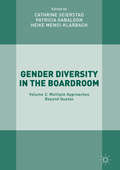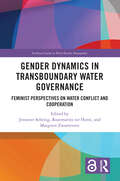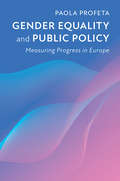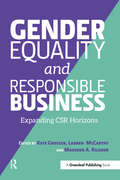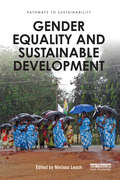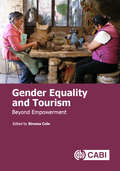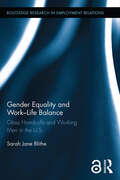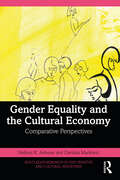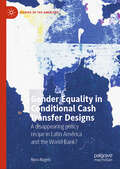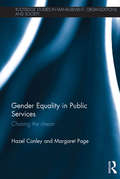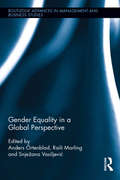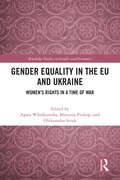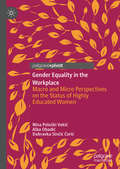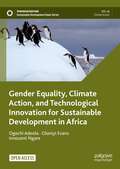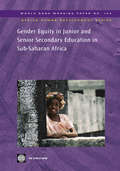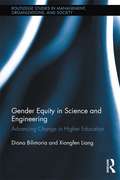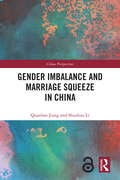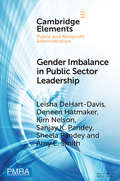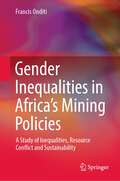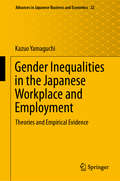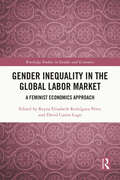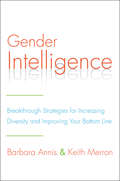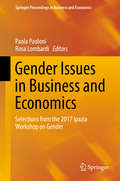- Table View
- List View
Gender Diversity in the Boardroom
by Cathrine Seierstad Patricia Gabaldon Heike Mensi-KlarbachThis edited collection provides a structured and in-depth analysis of the current use of multiple approaches beyond quotas for resolving the pressing issue of gender inequality, and the lack of female representation on corporate boards. Filling the gap in existing literature on this topic, the two volumes of Gender Diversity in the Boardroom offers systematic overviews of current debates surrounding the optimisation of gender diversity, and the suggested pathways for progress. Focusing on sixteen European countries, the skilled contributors explore the current situation in relation to women on boards debates and approaches taken. They include detailed reflections from critical stakeholders, such as politicians, practitioners and policy-makers. Volume 2 focuses on eight European countries having multiple approaches beyond quotas and is a promising and highly valuable resource for academics, practitioners, policy makers and anyone interested in gender diversity because it examines and critiques the current corporate governance system and national strategies for increasing the share of women not only on boards, but within companies beyond the boardroom.
Gender Dynamics in Transboundary Water Governance: Feminist Perspectives on Water Conflict and Cooperation (Earthscan Studies in Water Resource Management)
by Jenniver Sehring Rozemarijn ter Horst and Margreet ZwarteveenThis volume assesses the nexus of gender and transboundary water governance, containing empirical case studies, discourse analyses, practitioners’ accounts, and theoretical reflections. Transboundary water governance exists at the intersection of two highly masculinised fields: diplomacy and water resources management. In both fields, positions are mainly held by men, and core ideas, norms, and guiding principles that are presented as neutral, are both shaped by men and based on male experiences. This book sheds light on the often hidden gender dynamics of water conflict and cooperation at the transboundary level and on the implicit assumptions that guide research and policies. The individual chapters of the book, based on case studies from around the world, reveal the gendered nature of water diplomacy, take stock of the number of women involved in organisations that govern shared waters, and analyse programmes that have been set up to promote women in water diplomacy and the obstacles that they face. They explore and contest leading narratives and knowledge that have been shaped mainly by privileged men, and assess how the participation of women concretely impacts the practices, routines, and processes of water negotiations. This volume will be of great interest to students and scholars of water governance, water diplomacy, gender, international relations and environmental politics. It will also be of interest to professionals and policymakers involved in supporting gender mainstreaming in water cooperation.
Gender Equality and Public Policy: Measuring Progress in Europe
by Paola ProfetaDespite formal UN and European Commission commitments to improve gender imbalances, progress towards gender equality in wealth and pay has progressed at a discouragingly slow pace in recent decades. European countries have been more proactive in their support for corrective policies, such as family leave and gender quotas for corporate boards, yet measuring the effectiveness of these policies has proven difficult. This book offers a close comparative analysis of gender-targeted policies in Europe, providing an in-depth overview of how public policy is shaping gender equality, and how the presence of women in the economy and decision-making positions is itself shaping public policy. Paola Profeta bases her analysis on new data and an innovative interdisciplinary perspective for understanding the relationship between gender, equality and public policy, and their final impact on the European economy and society, with lessons that resonate beyond Europe.
Gender Equality and Responsible Business: Expanding CSR Horizons
by Maureen A. Kilgour Kate Grosser Lauren McCarthyGender Equality and Responsible Business places gender equality at the heart of the responsible business agenda with the aim of contributing to CSR practice as well as research. Discussion about gender issues in the field of corporate responsibility has focused on workplace issues and corporate boards, which are important areas of work. However, the great benefit of exploring gender issues through a responsible business lens is that this requires us to also examine the wider gender impacts of business in the marketplace – for example, with regard to suppliers, supply chains, and consumers, and with respect to the communities where business operates, and the wider ecological environment – indeed throughout corporate value chains.Through contributions from practitioners in business and civil society, as well as academia, this book broadens the agenda, opening the field to new voices, and facilitates dialogue among and between practitioners and researchers. Contributions within the edited collection elucidate current practice, bring new perspectives, and help us to expand the field of responsible business with regard to gender equality, and beyond.
Gender Equality and Sustainable Development (Pathways to Sustainability)
by Melissa LeachFor pathways to be truly sustainable and advance gender equality and the rights and capabilities of women and girls, those whose lives and well-being are at stake must be involved in leading the way. Gender Equality and Sustainable Development calls for policies, investments and initiatives in sustainable development that recognize women’s knowledge, agency and decision-making as fundamental. Four key sets of issues - work and industrial production; population and reproduction; food and agriculture, and water, sanitation and energy provide focal lenses through which these challenges are considered. Perspectives from new feminist political ecology and economy are integrated, alongside issues of rights, relations and power. The book untangles the complex interactions between different dimensions of gender relations and of sustainability, and explores how policy and activism can build synergies between them. Finally, this book demonstrates how plural pathways are possible; underpinned by different narratives about gender and sustainability, and how the choices between these are ultimately political. This timely book will be of great interest to students, scholars, practitioners and policy makers working on gender, sustainable development, development studies and ecological economics.
Gender Equality and Tourism: Beyond Empowerment
by Stroma Cole Carlos Costa Kylie Radel Lucy Ferguson Daniela Moreno Alarcón Marília Durão Zélia Breda Fiona Eva Bakas Paola Vizcaino Suárez Belén Martínez Caparrós Meghan Muldoon Wendy Wendy Heather Jeffrey Isis Arlene Díaz-Carrión Hazel Tucker Inês CarvalhoDoes tourism empower women working in and producing tourism? How are women using the transformations tourism brings to their advantage? How do women, despite prejudice and stereotypes, break free, resist and renegotiate gender norms at the personal and societal levels? When does tourism increase women's autonomy, agency and authority? The first of its kind this book delivers: A critical approach to gender and tourism development from different stakeholder perspectives, from INGOs, national governments, and managers as well as workers in a variety of fields producing tourism. Stories of individual women working across the world in many aspects of tourism. A foreword by Margaret Bryne Swain and contributions from academics and practitions from across the globe. A lively and accessible style of writing that links academic debates with lived realities while offering hope and practical suggestions for improving gender equality in tourism. Gender Equality and Tourism: Beyond Empowerment, a critical gendered analysis that questions the extent to which tourism brings women empowerment, is an engaging and thought-provoking read for students, researchers and practitioners in the areas of tourism, gender studies, development and anthropology. To access a presentation delivered by Stroma Cole as well as an interview with her, please visit http://www.cabi.org/openresources/94422
Gender Equality and Tourism: Beyond Empowerment
by Carlos Costa Kylie Radel Lucy Ferguson Daniela Moreno Alarcón Marília Durão Zélia Breda Fiona Eva Bakas Belén Martínez Caparrós Meghan Muldoon Wendy Wendy Heather Jeffrey Isis Arlene Díaz-Carrión Hazel Tucker Inês Carvalho Paola Vizcaino-SuárezDoes tourism empower women working in and producing tourism? How are women using the transformations tourism brings to their advantage? How do women, despite prejudice and stereotypes, break free, resist and renegotiate gender norms at the personal and societal levels? When does tourism increase women's autonomy, agency and authority? The first of its kind this book delivers: A critical approach to gender and tourism development from different stakeholder perspectives, from INGOs, national governments, and managers as well as workers in a variety of fields producing tourism. Stories of individual women working across the world in many aspects of tourism. A foreword by Margaret Bryne Swain and contributions from academics and practitions from across the globe. A lively and accessible style of writing that links academic debates with lived realities while offering hope and practical suggestions for improving gender equality in tourism. Gender Equality and Tourism: Beyond Empowerment, a critical gendered analysis that questions the extent to which tourism brings women empowerment, is an engaging and thought-provoking read for students, researchers and practitioners in the areas of tourism, gender studies, development and anthropology. To access a presentation delivered by Stroma Cole as well as an interview with her, please visit http://www.cabi.org/openresources/94422
Gender Equality and Work-Life Balance: Glass Handcuffs and Working Men in the U.S. (Routledge Research in Employment Relations)
by Sarah BlithePressure to achieve work-life "balance" has recently become a significant part of the cultural fabric of working life in United States. A very few privileged employees tout their ability to find balance between their careers and the rest of their lives, but most employees face considerable organizational and economic constraints which hamper their ability to maintain a reasonable "balance" between paid work and other life aspects—and it is not only women who struggle. Increasingly men find it difficult to "do it all." Women have long noted the near impossibility of balancing multiple roles, but it is only recently that men have been encouraged to see themselves beyond their breadwinner selves. Gender Equality and Work-Life Balance describes the work-life practices of men in the United States. The purpose is to increase gender equality at work for all employees. With a focus on leave policy inequalities, this book argues that men experience a phenomenon called "the glass handcuffs," which prevents them from leaving work to participate fully in their families, homes, and other life events, highlighting the cultural, institutional, organizational, and occupational conditions which make gender equality in work-life policy usage difficult. This social justice book ultimately draws conclusions about how to minimize inequalities at work. Gender Equality and Work-Life Balance is unique as it laces together some theoretical concepts which have little previous association, including entrepreneurialism; leave policy, occupational identity, and the economic necessities of families. This book will therefore be of particular interest to researches and academics alike in the disciplines of Gender studies, Human Resource Management, Employment Relations, Sociology and Cultural Studies.
Gender Equality and the Cultural Economy: Comparative Perspectives (Routledge Research in the Creative and Cultural Industries)
by Helmut K. Anheier Darinka MarkovicThe status of women in the creative and cultural industries remains precarious. This comparative analysis provides insights from seven key economies to help understand progress towards gender equality in culture and the arts and the broader cultural economy.With empirical and policy analysis spanning Europe and the US, the authors investigate the extent to which gender equality has entered the mainstream along dimensions of leadership, access and awards, pay and pension gaps, work-life balance, and the monitoring of gender equality. While many of the structural barriers have been erased, countries differ significantly in how much gender equality has been achieved in the creative economy and how much female talent is lost and unrecognized.This book is essential reading for scholars, policymakers, and practitioners across the human and social sciences, especially those involved with arts management and the creative or cultural economy more broadly.
Gender Equality in Business: 100 Years of Progress?
by Boris Groysberg Colleen Ammerman"Gender Equality in Business: 100 Years of Progress?" traces the history of women in management from the early 20th to early 21st century through analysis of Harvard Business Review's coverage of women and gender. The case identifies six distinct phases in the evolution of women's opportunities and barriers as well as attitudes toward professional women. It explores when and how concepts like equal pay for equal work, sexual harassment, female leadership, and the 'mommy track' influenced organizational approaches to hiring and promoting women. Ultimately, it accounts for tremendous progress made in women's status in the workplace but notes that gender parity has not yet been achieved. What will it take for gender gaps to close as the 21st century continues?
Gender Equality in Conditional Cash Transfer Designs: A disappearing policy recipe in Latin America and the World Bank? (Studies of the Americas)
by Nora NagelsFew aspects of social policy have been more controversial than the effects of Conditional Cash Transfers (CCTs) on gender relations and policy outcomes on gender relations are linked to policy designs. Development and social policy communities have recognized gender equality as a cornerstone of development and social progress. Nonetheless, designing policy to integrate gender equality goals into social policies is rendered that much more complicated as and when these policies travel. In Mexico in 1997, the first CCT, Progresa, looked quite different than CCTs look today. Embedded in the design was Affirmative Action geared toward girls, as was a clearly enunciated concern about the program's effects on female empowerment. For the 2005 Peruvian CCT, Juntos, the story was very different. Its design did not include any gender equality goals and it reproduced long-standing social policy legacies of gendered exclusions. Therefore, this book is about the alteration of Conditional Cash Transfer designs in relation to gender equality goals as they have made their way through Latin America as well as through the World Bank. This book aims to account for “the fading goal of gender equality” (Jenson 2015) across time as part of this regional trajectory. In short, it tracks the how and the why of this trajectory in relation to gender equality goals.
Gender Equality in Public Services: Chasing the Dream (Routledge Studies in Management, Organizations and Society)
by Hazel Conley Margaret PageThe provision of state funded and democratically accountable care services represents one of the most potentially transformative advances in gendered social relations and equality for women by ‘defamilizing’ care and providing paid work. But the cost of providing these services, which women have access to them and how they should be provided are always at the forefront of debate, especially during economic crises. Socially funded and publicly accountable care services are therefore a key site of feminist activity, but also the frontline for spending cuts and 'reform' during times of austerity. Gender Equality in Public Services analyses how gender equality work in British public services is changing in response to factors including: equality legislation; the erosion of local democracy, privatisation of public services and new forms of feminist activism and leadership. It also assesses the challenges and opportunities for promoting women’s equality in producing and using public services.Impacting upon developed and developing economies, the arguments in this challenging book explore the potential of equality and feminist activism and leadership for radical and transformational change. It will appeal to advanced students, researchers and practitioners interested in social policy, feminist organization theory, equal opportunities and gender mainstreaming practice.
Gender Equality in a Global Perspective (Routledge Advances in Management and Business Studies #68)
by Anders Ortenblad Raili Marling Snjezana VasiljevicGender Equality in a Global Perspective looks to discuss whether Gender Equality can be adopted as it has been defined in international documents anywhere, or whether it needs to be adapted in a more local context; discuss which factors and perspectives need to be taken into account when adapting Gender Equality to specific contexts; suggest research approaches for studies on whether a universal (Western) concept of Gender Equality fits in certain specific contexts; and finally suggests challenges to the existing interpretation of Gender Equality (e.g., theory of intersectionality); and the development of legal and policy framework. This book is situated within the tradition of comparative gender studies. While most other such books take up and compare various ways of implementing (or not implementing) gender equality, this book studies and compares whether or not (and to what extent) a specific definition of Gender Equality (GE) could be adopted by various nations. Thus, all chapter contributors will engage with the same definition of GE, which will be presented within the book, and discuss the possibilities and constrains related to applying such a definition in their particular national context. The readers will learn about the problems of applying a universal concept of Gender Equality and the possible reasons for and modes of adapting Gender Equality to different contexts. Gender Equality in a Global Perspective looks to maintain a critical and reflexive stance towards the issues raised and will seek to present multiple perspectives and open-ended answers. As such it hopes to contribute to the international discussion of human rights more broadly and Gender Equality specifically. The intended audience is not limited only to but will include policy makers, scholars and students with an interest in Gender issues, Organizational Theory, Political Science, Human Development, Policy Analysis, Globalization and other management sub-disciplines.
Gender Equality in the EU and Ukraine: Women’s Rights in a Time of War (Routledge Studies in Gender and Economics)
by Maryana Prokop Oleksandra Struk Agata WłodkowskaThis book provides a comprehensive analysis of gender equality and women’s rights in Ukraine and the European Union, focusing on both political security and economic– social dimensions.The first part examines European gender policy standards in Ukraine, feminist foreign policy, women’s involvement in political protests, and the influential roles of First Ladies like Brigitte Macron, Agata Kornhauser- Duda, and Olena Zelenska in promoting gender equality. It also explores gendered aspects of military service, the portrayal of female refugees, and the EU’s response to sexual violence in the context of Russia’s war against Ukraine. The second part addresses economic and social issues, including the intersection of gender equality with sustainable development, gender- responsive budgeting, and women’s roles in business. It highlights women’s contributions to nonprofit organizations and discusses the experiences of Ukrainian female students in Poland as well as the status of single mothers in Ukraine and the UK.The study is relevant for policy formulation by institutions working on gender equality, foreign affairs, and human rights. It is also a valuable resource for universities, research institutes, think tanks, and civil society organizations involved in gender equality, human rights, and peacebuilding in Ukraine and Europe. The interdisciplinary nature of the publication, which integrates research from politics, law, sociology, international relations, economics, and pedagogy, makes it applicable to both general and specialized courses. It is dedicated to researchers and students in the social sciences, offering key insights for courses in gender studies, political science, international relations, human rights studies, eastern policy of EU, development studies, and European integration, and providing a foundation for critical reflection on gender equality policies and EU integration.
Gender Equality in the Workplace: Macro and Micro Perspectives on the Status of Highly Educated Women
by Nina Pološki Vokić Alka Obadić Dubravka Sinčić ĆorićFocusing on the status of highly educated women in the workplace, this book examines how a particular demographic and workforce group can help to close the gender gap worldwide. Despite contributing to the substantial fall of differentials between men and women on a global scale, the demographic of highly educated women is rarely explored in terms of its impact on gender equality. Drawing on both macro- and micro-level perspectives, this book analyses the theory behind gender segregation and initiatives for women’s inclusion, as well as offering empirical accounts of women’s experiences in the workplace. The authors have written a timely and valuable book that will appeal to both researchers of diversity and inclusion in the workplace, but also policy-makers and practitioners involved in HR.
Gender Equality, Climate Action, and Technological Innovation for Sustainable Development in Africa (Sustainable Development Goals Series)
by Ogechi Adeola Olaniyi Evans Innocent NgareThis open access book explores the intersection of gender and climate change, suggests ways in which innovative technologies can accelerate climate relief actions, and offers strategies for integrating climate change initiatives into national policies and planning. By examining the devastating consequences of climate change on women and girls throughout the continent, the authors pose a crucial question: Does gender matter in climate change discussions in Africa? Political and social traditions have burdened women with greater vulnerability to the impacts of climate-related natural disasters, including violence, displacement, poverty, famine and lack of access to clean water. However, women are also key to effective and inclusive climate mitigation, adaptation, and decision-making. The authors provide a compelling discourse that identifi es the social and economic benefi ts for all citizens when genderinclusive policies shape equitable and targeted action plans, from mitigationto adaptation and funding.The UN’s SDG 13 calls for urgent action and commitment to combat climate change. The implementable and action-oriented propositions presented in this book will be of interest to students, educators, practitioners, third-sector actors, and policymakers committed to gender equality, sustainable development and climate action in Africa.
Gender Equity in Junior and Senior Secondary Education in Sub-Saharan Africa
by World BankThis thematic study consists of case studies of Ghana, Malawi, and Uganda, as well as, a review of studies undertaken over the past ten years on education in Africa with particular attention to girls' and secondary education. Gender equity at the primary level has been the focus of considerable attention within the Education for All Framework of Action, but much less so at the secondary level. Evidence of gender inequity and inequality in terms of access, retention and performance in secondary education in SSA raises many questions. While transition rates from primary to secondary are higher for girls than boys, and the repetition rates are lower, girls still significantly trail behind boys in graduation and enrollment rates. The purpose of this study is to document and analyze the extent and nature of gender disadvantage in junior and senior secondary education, to analyze the causes of this disadvantage, and to identify strategies that may be effective in reducing or eliminating it. This study was prepared as part of the Secondary Education and Training in Africa (SEIA) initiative which aims to assist countries to develop sustainable strategies for expansion and quality improvements in secondary education and training. All SEIA products are available on its website: www.worldbank.org/afr/seia.
Gender Equity in Science and Engineering: Advancing Change in Higher Education (Routledge Studies in Management, Organizations and Society)
by Diana Bilimoria Xiangfen LiangWomen faculty’s participation in academic science and engineering is critical for future US global competitiveness, yet their underrepresentation particularly in senior positions remains a widespread problem. To overcome persistent institutional resistance and barriers to change, the NSF ADVANCE institutional transformation initiative, instituted in 2001, seeks to increase the workforce participation of women faculty in academic science and engineering through systematic institutional transformation. This book assesses the equity, diversity and inclusion outcomes of the changes underway at 19 universities. It provides a comprehensive, stand-alone description of successful approaches to increase the recruitment, advancement and retention of women faculty throughout the academic career pipeline. The findings show that targeted institutional transformation at these 19 U.S. universities has resulted in significant increases in women faculty’s workforce participation, as well as improved gender equity and inclusion. Analyses by discipline show that the greatest changes have occurred within engineering and natural science disciplines at these universities. Yet the results also point to the overall continued underrepresentation of women faculty in academic science and engineering at the nation’s research universities. A framework of organizational change is derived to serve as a template to academic and other organizations seeking transformation to enhance gender equity, diversity and inclusion.
Gender Imbalance and Marriage Squeeze in China (ISSN)
by Shuzhuo Li Quanbao JiangThis book presents a comprehensive analysis of China’s imbalanced sex ratio at birth and marriage market, and the implications of these phenomena for population development and families.China’s persistently high sex ratio at birth (SRB) since the early 1980s has led to serious gender imbalance and male marriage squeeze. After examining the quality of existing data on SRB, the authors provide their estimates of the sex-selective abortion rate, describe the trends and geographical patterns in SRB, and disaggregate changes in SRB by birth order and province. Special attention is given to the number and proportion of missing girls between 1980 and 2010. Based on the quantitative analyses, the book projects the implications of the severe gender imbalance for China’s population development and the future dynamics of the marriage market, including trends in age at first marriage, the proportion of never-married, the age structure of surplus males, and the life cycle of bare branch families.The book will appeal to scholars and students of demography, sociology, and China studies, especially those interested in China’s population and contemporary society.
Gender Imbalance in Public Sector Leadership: The Glass Cliff in Public Service Careers (Elements in Public and Nonprofit Administration)
by Amy Smith Kim Nelson Sanjay K. Pandey Leisha DeHart-Davis Deneen Hatmaker Sheela PandeyWomen are still underrepresented as public-sector organizational leaders, despite comprising half of the United States public-sector workforce. To explore the factors driving gender imbalance, this Element employs a problem-driven approach to examine gender imbalance in local government management. We use multiple methods, inductive and deductive research, and different theoretical frames for exploring why so few women are city or county managers. Our interviews, resume analysis and secondary data analysis suggesting that women in local government management face a complex puzzle of gendered experiences, career paths and appointment circumstances that lend insights into gender imbalanced leadership in this domain.
Gender Inequalities in Africa’s Mining Policies: A Study of Inequalities, Resource Conflict and Sustainability
by Francis OnditiThis book develops a discursive ‘equalitarian’ theoretical framework for studying African mining ecosystem issues and policy interventions. The theory of ‘equalitarianism’ is developed as an alternative to the reductionist approach that has dominated post-colonial debates about the classical jus ad bellum requirements to empower women in development spaces. However, the classical approach narrows the debate down to “women issues,” rather than the ‘whole-of-society.’ As a consequence of this reductionism, women continue to be devalued in the mining sector, characterized by poverty traps, power struggles, and a lack of capacity to engage in large-scale mining (LSM) activities. This book advances principles for a holistic approach, and spells out the implications for women across the mining value chain. Drawing on moral scholarship, the book poses that for women to gain access to strategic spaces in the mining sector, the drive for empowerment must be embedded within ‘whole-of-society’ principles. This book is of interest to scholars researching gender policy, public policy, political philosophy, conflictology, and human geography. It also offers practitioners a guide for evaluating their policy work on mainstreaming gender in the mining sector, presenting options for financing, forging partnership and planning for an inclusive economic development in Africa, and beyond.
Gender Inequalities in the Japanese Workplace and Employment: Theories and Empirical Evidence (Advances in Japanese Business and Economics #22)
by Kazuo YamaguchiThe in-depth analyses presented in this book have a dual focus: (1) Social mechanisms through which the gender wage gap, gender inequality in the attainment of managerial positions, and gender segregation of occupations are generated in Japan; and (2) Assessments of the effects of firms’ gender-egalitarian personnel policies and work–life balance promotion policies on the gender wage gap and the firms’ productivity. In addition, this work reviews and discusses various economic and sociological theories of gender inequality and gender discrimination and considers their consistencies and inconsistencies with the results of the analysis of Japanese data. Furthermore, the book critically reviews and discusses the historical development of the Japanese employment system by juxtaposing rational and cultural explanations. This book is an English translation by the author of a book he first published in Japanese in 2017. The original Japanese-language edition received two major book awards in Japan. One was The Nikkei Economic Book Culture Award, which is given every year by the Nikkei Newspaper Company and the Japan Economic Research Center to a few best books on economy and society. The other was The Showa University’s Women’s Culture Research Award, which is bestowed annually on a single book of research that promotes gender equality. Kazuo Yamaguchi is the Ralph Lewis Professor of Sociology at the University of Chicago.
Gender Inequality in the Global Labor Market: A Feminist Economics Approach (Routledge Studies in Gender and Economics)
by David Castro Lugo Pérez, Reyna Elizabeth RodríguezThis book examines gender inequality from the perspective of feminist economics, with empirical application, across different countries such as Turkey, the United States, Mexico, Uruguay, Argentina, Colombia, Costa Rica and territories within Europe.It centers on topics such as labor participation, occupational segregation, feminization of poverty and migration, wage differentials, changes in and the quality of employment, equity index, and gender bias in fiscal policies. It encompasses both developed and developing countries and shows that the gender gap has been narrowing over time, although not completely, mainly due to the sparse implementation of programs and public policies with a feminist economic approach, which help to make gender dimensions in the economy visible and highlight the implications this has on women’s lives. The book also examines the impact of the COVID-19 crisis on inequality on the working lives of men and women.This book will be an important asset in teaching forums on the most recent advances in economic science across a number of different theories, approaches and research hypotheses that explain the study of gender inequality. It also presents different empirical studies, using multiple methodologies and databases, applied to specific problems in multiple countries to identify the advances, opportunities and changes that have occurred in gender inequality from a feminist economic perspective. The book offers relevant, novel and original scientific data and makes public policy proposals to encourage the participation of women in the labor market. Consequently, it will also be of interest to policymakers concerned with global trends in the labor market.
Gender Intelligence
by Keith Merron Barbara AnnisWorld-renowned experts on Gender Intelligence argue that it is time to move beyond politics and fairness to build an economic business case for gender diversity in the workplace.For too long, companies have played the numbers game--attempting to tackle the problem of gender imbalance through affirmative action, numeric standards, and quotas. Yet these efforts have had no measurable impact on the number of women in leadership or on a company's bottom line. Meanwhile, the dominant paradigm of traditional business remains the same.In Gender Intelligence, Barbara Annis and Keith Merron introduce a revolutionary and effective approach that is fundamentally altering the cultures of major corporations around the world. They uncover the forces that create the current condition of gender inequality and reveal, for the first time, the powerful principles that are bringing about a shift in thinking. They highlight organizations that have made the transformation from a focus on gender equity to the more powerful objective of welcoming the natural differences between men and women, which ultimately produces greater economic value. Gender Intelligence proves that the true measure of gender equality does not reside in a percentage but in the untapped power of men and women openly working and winning together.
Gender Issues in Business and Economics
by Rosa Lombardi Paola PaoloniThis volume presents current research on gender studies in the specific context of the knowledge economy. Featuring contributions from the 2017 Annual Ipazia, the Scientific Observatory for Gender Studies Workshop on Gender, this book investigates gender issues and female entrepreneurship from social, economic, corporate, organizational, and management perspectives, with particular emphasis on advancing the understanding of gender in business and economic research. The post-industrial knowledge economy is characterized by an emphasis on human capital as the real engine of sustainable growth and development. With women comprising an increasing share of the global workforce, gender studies play a central role in exploring and understanding the attitudes and skills of women in business and their impact on economic and social development. Gender inequality in public and private contexts is decreasing due to an increase of women in leadership roles in business, the expansion and diversity of females in education, and a larger presence of women in policymaking roles. Ipazia, the Scientific Observatory for Gender Studies, aims to define an updated framework of research, service and projects on women and gender relations to highlight the evolution of gender in business and economics. This volume features contributions on female-owned family business, gender diversity in organizations, gender capital, and immigration from the 2017 Ipazia workshop.
